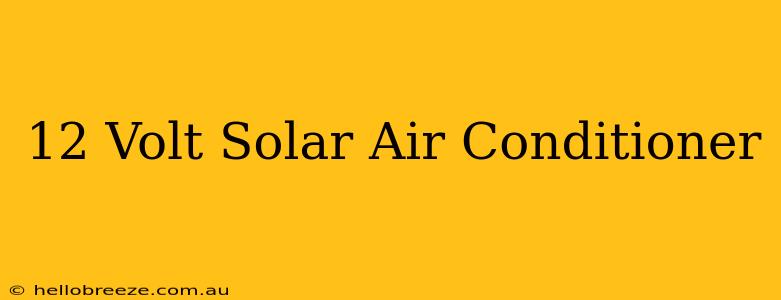Are you looking for a way to stay cool and comfortable without relying on the grid? A 12-volt solar air conditioner might be the perfect solution for your off-grid home, RV, or boat. This comprehensive guide will explore the benefits, considerations, and everything you need to know about these innovative cooling systems.
What is a 12 Volt Solar Air Conditioner?
A 12-volt solar air conditioner is a cooling unit designed to operate on a 12-volt DC power supply, typically sourced from solar panels. Unlike traditional AC units that run on 110-240V AC power, these systems offer a sustainable and independent cooling solution. They are particularly useful in locations without access to the electrical grid or for those seeking to reduce their carbon footprint.
Key Features and Benefits:
- Off-Grid Cooling: The most significant advantage is the ability to cool your space without relying on the traditional power grid. This is invaluable in remote locations, during power outages, or for eco-conscious individuals.
- Solar Power Integration: Seamless integration with solar panels allows for entirely renewable energy operation, minimizing your environmental impact.
- Portable and Versatile: Many 12-volt solar air conditioners are designed for portability, making them ideal for RVs, boats, and even camping.
- Energy Efficiency: While the initial investment might be higher, the long-term running costs can be significantly lower than traditional AC units, especially when combined with ample solar power.
- Quiet Operation: Many models prioritize quiet operation, ensuring a peaceful and comfortable environment.
Types of 12 Volt Solar Air Conditioners:
There are several types available, each with its own strengths and weaknesses:
1. Absorption Air Conditioners:
These use a refrigerant and an absorbent liquid to create a cooling effect. They are generally more energy-efficient at lower cooling capacities, but may not be as powerful as compressor-based units.
2. Compressor Air Conditioners:
These are more powerful and can handle larger spaces, but they tend to consume more energy. They are generally better suited for larger RVs or similar applications.
3. Evaporative Coolers (Swamp Coolers):
These are a less energy-intensive option, best suited for dry climates. They work by evaporating water, which cools the air, and are not as efficient in humid environments.
Factors to Consider When Choosing a 12 Volt Solar Air Conditioner:
- Cooling Capacity (BTU/hr): Choose a unit with sufficient BTU/hr to effectively cool the space you intend to use it in. Consider the size of the area and the climate.
- Power Consumption (Watts): This will determine the size of your solar panel array and battery bank required to support the system.
- Efficiency (SEER Rating): Look for a unit with a high SEER (Seasonal Energy Efficiency Ratio) rating to ensure optimal energy efficiency. Although SEER ratings are less common for 12V units, it’s a metric to keep in mind.
- Size and Weight: Consider the physical dimensions and weight of the unit, especially for portable applications.
- Noise Level: Check the manufacturer's specifications for noise level (dB).
- Installation Requirements: Understand the installation process and any necessary modifications to your RV, boat, or home.
Installing and Maintaining Your 12 Volt Solar Air Conditioner:
Proper installation and maintenance are crucial for the longevity and efficiency of your air conditioner. Always consult the manufacturer's instructions for specific guidance. Regular cleaning of filters and coils is vital to maintain optimal performance.
Choosing the Right Solar Panel System:
To power your 12-volt solar air conditioner effectively, you need a sufficiently sized solar panel array and battery bank. Consult a solar professional to determine the appropriate size for your specific needs. Consider factors like average daily sunlight hours, energy consumption of the AC unit, and desired runtime.
12-volt solar air conditioners offer a sustainable and increasingly accessible way to enjoy cool comfort, even off the grid. By carefully considering the factors outlined above, you can choose and install a system that meets your specific needs and enhances your comfort and independence. Remember to always consult with professionals for installation and sizing to ensure optimal performance and safety.

